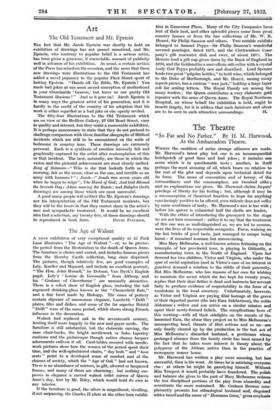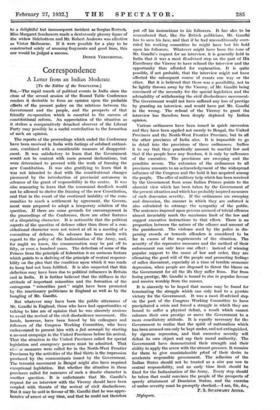The Theatre
"So Far and No Father." By H. M. Harwood. At the Ambassadors Theatre.
WITHIN the cauldron of satire strange alliances are made. Mr. Harwood's latest play but one is an inconsequential hotchpotch of good lines and bad jokes ; it includes one scene which is in questionable taste ; another, in itself perhaps the most amusing of all, which bears no relation to the rest of the plot and depends upon technical detail for its force. The noses of convention and of heresy, of the extraordinary and the commonplace, are tweaked alike ; and no explanations are given. Mr. Harwood claims Jaques' privilege of liberty for his fooling ; but, although it may be a misconception of theatrical function to hope for anything convincingly positive to be offered, even ridicule does not suffer by some semblance of unity. Mr. Harwood's aim is too wide ; before his quiver is exhausted half the shafts are leaden.
With the ethics of introducing the graveyard to the stage we are not here concerned : suffice it to say that the treatment of this one was as undistinguished as, we are led to assume, were the lives of its respectable occupants. Farce, walking on the hot bricks of good taste, just managed to escape being burnt : it remained immune but unconvincing.
Miss Mary Melbourne, a well-known actress fattening on the triumphs of her provincial tour, is playing in Oldcastle, a manufacturing town in the North of England. Upon her descend her two children, Victor and Virginia, who under the spur of social aspiration (and in Victor's case of an interest in genetics) demand a solution to the riddle of their paternity. But Miss Melbourne, who has reasons of her own for wishing to maintain the secret which she has kept for twenty years, replies that their dear father is dead and instructs her servant Sally to produce evidence of respectability in the form of a tombstone in the local cemetery. Unfortunately, however, as Victor and Virginia are paying filial homage at the grave of their departed parent (the late Ezra Sidebottom), the noble Alderman's widow and son arrive on a similar mission and upset their newly-formed beliefs. The complications born of this meeting—with all their sidelights on the morals of the lamented Ezra, the abuse they project on to Miss Melbourne's unsuspecting head, threats of libel actions and so on—are only finally cleared up by the production in the last act of Miss Melbourne's discarded husband, a gentleman whose prolonged absence from the family circle has been caused by the fact that he takes more interest in theory about; the polygamy of the African native than in the practice of monogamy nearer home.
Mr. Harwood has written a play more amusing, but less successful, than is his wont. At times he is satirizing everyone else : at others he might be parodying himself. Without Miss Tempest it would probably have foundered. The polish and balance she gives to the part of Mary Melbourne redeem the less disciplined portions of the play from absurdity and accentuate the more restrained. Mr. Graham Browne com- plaisantly presents her ethnological husband and, disguised with a beard and the name of " Hermann Grou," gives emphasis to a delightful but inconsequent incident as Sergius Bartsch. Miss Margaret Scudamore made a dexterously gloomy figure of the widow Sidebottom and Mr. Robert Andrews was effective as Victor Melbourne. If it were possible for a play to be constructed solely of amusing fragments and good lines, this one would be judged a success.
DEREK VERSCHOYLE.



































 Previous page
Previous page